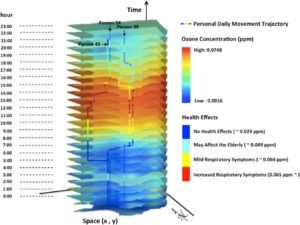Year: 2017
Author(s): Yoo Min Park and Mei-Po Kwan
Abstract: This study aims to empirically demonstrate the necessity to consider both the spatiotemporal variability of air pollution and individual daily movement patterns in exposure and health risk assessment. It compares four different types of exposure estimates generated by using (1) individual movement data and hourly air pollution concentrations; (2) individual movement data and daily average air pollution data; (3) residential location and hourly pollution levels; and (4) residential location and daily average pollution data. These four estimates are significantly different, which supports the argument that ignoring the spatiotemporal variability of environmental risk factors and human mobility may lead to misleading results in exposure assessment. Additionally, three-dimensional (3D) geovisualization presented in the paper shows how person-specific space-time context is generated by the interactions between air pollution and an individual, and how the different individualized contexts place individuals at different levels of health risk.
Journal: Health & Place
Permanent link: https://doi.org/10.1186/s12942-018-0146-8

